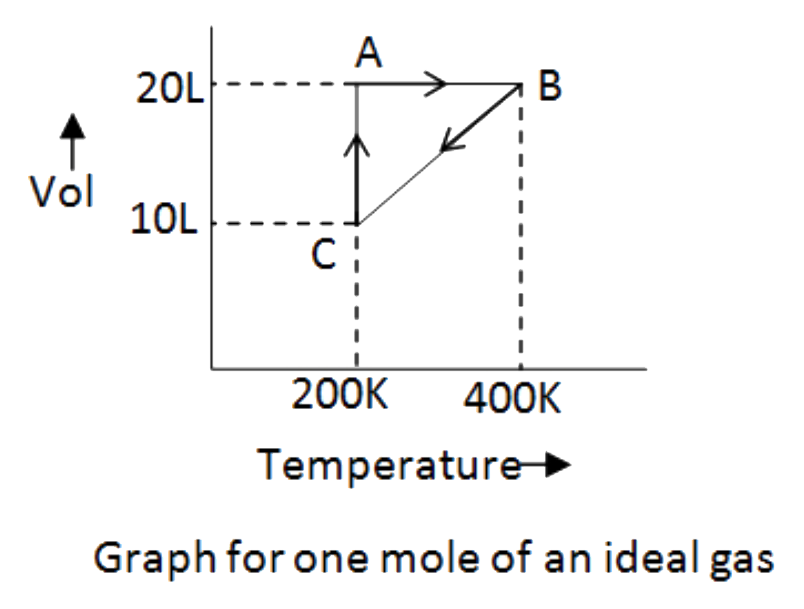During expansion of a gas into vaccum (Pext=0), Work done is zero if the process is
(A) Reversible (B) Irreversible (C ) Isothermal
B & C are true
A, B & C are false
A & C are true
B & C are false
The correct Answer is:A
To solve the question regarding the work done during the expansion of a gas into a vacuum, we need to analyze the conditions under which the work done is zero.
1. Understanding Work Done in Expansion:
The work done (W) during the expansion of a gas is given by the formula:
W=−PextΔV
where Pext is the external pressure and ΔV is the change in volume.
2. Identifying the External Pressure:
In the given scenario, the gas is expanding into a vacuum, which means that the external pressure Pext=0.
3. Calculating Work Done:
Substituting Pext=0 into the work done formula:
W=−0×ΔV=0
This indicates that the work done during the expansion of the gas into a vacuum is zero.
4. Considering the Type of Process:
The question asks about the type of process (reversible, irreversible, isothermal) under which the work done is zero. Since we established that the work done is zero due to Pext=0, it applies regardless of whether the process is reversible or irreversible.
5. Conclusion:
Therefore, the work done is zero during the expansion of a gas into a vacuum if the process is:
- (A) Reversible
- (B) Irreversible
- (C) Isothermal
Since the work done is zero in all these cases, we can conclude that options (A), (B), and (C) are correct.
Final Answer:
The correct options are (A), (B), and (C).
---
The work done (W) during the expansion of a gas is given by the formula:
W=−PextΔV
where Pext is the external pressure and ΔV is the change in volume.
In the given scenario, the gas is expanding into a vacuum, which means that the external pressure Pext=0.
Substituting Pext=0 into the work done formula:
W=−0×ΔV=0
This indicates that the work done during the expansion of the gas into a vacuum is zero.
The question asks about the type of process (reversible, irreversible, isothermal) under which the work done is zero. Since we established that the work done is zero due to Pext=0, it applies regardless of whether the process is reversible or irreversible.
Therefore, the work done is zero during the expansion of a gas into a vacuum if the process is:
- (A) Reversible
- (B) Irreversible
- (C) Isothermal
The correct options are (A), (B), and (C).
Similar Questions
Find work done in the irreversible process C→A.

View SolutionIf the boundary of system moves by an infinitesimal amount, the work involved is given by dw=−PextdV
for irreversible process w=−PextΔV (where ΔV=Vf−Vi)
for reversible process Pext=Pint±dP≅Pint
so for reversible isothermal process w=−nRTln.VfVi
2mole of an ideal gas undergoes isothermal compression along three different plaths :
(i) reversible compression from Pi=2 bar and Vi=8L to Pf=20 bar
(ii) a single stage compression against a constant external pressure of 20 bar, and
(iii) a two stage compression consisting initially of compression against a constant external pressure of 10 bar until Pgas=Pext, followed by compression against a constant pressure of 20 bar until Pgas=Pext
Work done (in bar-L) on the gas in reversible isothermal compression is :
View Solution
Knowledge Check
Assertion : A quasi static isothermal expansion of an ideal gas in a cylinder fitted with a frictionless movable pistonis a irreversible process.
Reason : A process is irreversible only if system remains in equilibrium with the surroundings at every stage.AIf both assetion and reason are true and reaasons is the correct expanation of assetionBIf both assetion and reason are tur but reason is not the correct explanation of assetionCIf assertion is true but reason is falseDIf both assertion and reason are false.
Work done in reversible isothermal expansion is given by
View SolutionA gas is expanded from volume V1 to V2 through three different process:
a. Reversible adiabatic
b. Reversible isothermal
c. Irreversible adiabatic (against a constant external pressure Pex)
The correct option is
View SolutionFor an isothermal process
View SolutionThe change in entropy of an ideal gas during reversible isothermal expansion is
View SolutionShow that the entropy changes in a reversible isothermal process is zero.
View SolutionIn an isothermal expansion of a gaseous sample the correct relation is (consider w(work) with sign according to new IUPAC convention)
[The reversible and irreversible processes are carried out between same initial and final states]
View Solution1 moles of an ideal gas expanded spontaneously into vaccum. The work done will be
View Solution
